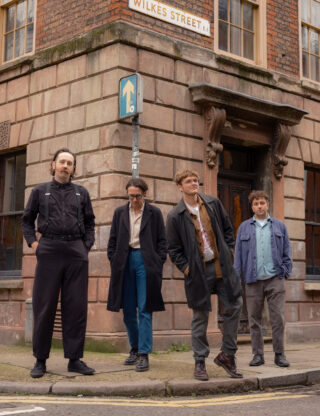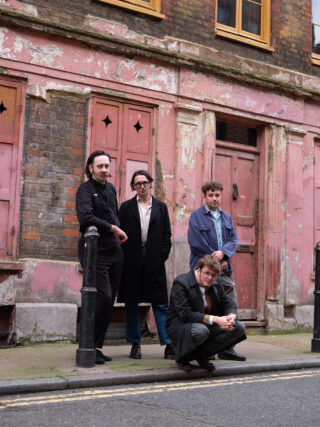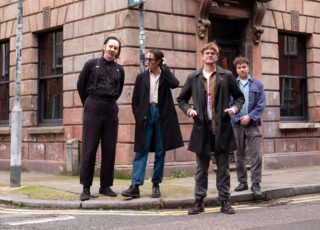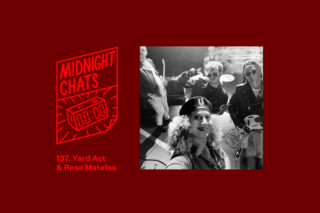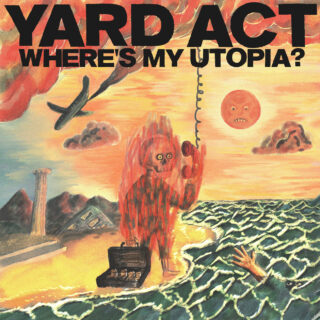Where their early songs featured recognisable antiheroes like the “school-of-hard-knocks” neighbour Graham in ‘Fixer Upper’, the voice on this record is more recognisably Smith’s, though he cloaks his confessions in humour. “You could go too far and descend into novelty at any moment,” he notes, “but that risk is what makes it exciting. It’s easy to be cool and aloof, to stare into the distance and play your no-wave chords, but to be honest about how fucking daft you actually are, it’s more vulnerable, and maybe that’s what resonates with people.” It’s the same whether he’s channelling his own insecurities or the rants of someone he met down his local. There’s surely an irony to finding your own voice through other people’s soundbites? “I think the funniest thing about all those characters is that they were me all along. The whole first album is about a man in his late 20s/early 30s who jacks in his ideals and dreams to become an estate agent. But the estate agent was me signing to a major record label. I just didn’t have the confidence to write as myself.”
So he wrote knowingly flawed characters, always intending their humanity to shine through the cracks. He’s not convinced he’s achieved this, or if listeners are interested in hearing both sides. “A lot of people want to cartoonize society and make it really black and white,” says Smith. “They want heroes and villains and clearly-defined lines in the sand. They want to remove the human element, they want caricatures.” But Smith’s hard-bitten observations rely on a dash of romanticism; there’s a pathos to his portrayals of these slightly bigoted everymen dreaming of times gone by.
And then of course there’s Smith himself, who is nearly as nostalgic as the cranks he writes about. Like any millennial getting older, he’s charmed by memories of penny sweets, dial-up modems and all-you-can-drink indie discos, recalling the 1990s/2000s as an easier time. “We were very fortunate to grow up before the internet really took over,” he says. “You went out and you lived your life, you weren’t on camera or under scrutiny. The stakes are higher now.”
Obviously, he stops short of thinking of his youth as a perfect era. “In a world that’s so uncertain I understand why people rely on nostalgia, and there’s nothing wrong with comforting yourself. But when you get lost in it and start thinking the past is how the future should work, it becomes dangerous.” It’s just one of many seductive illusions haunting Where’s My Utopia?, another being the idea that fame can solve your problems. Both Smith and Needham are acutely aware of how ephemeral success can be, approaching Yard Act with the discipline of a day job. At times, Smith says, this doesn’t sit comfortably with being an artist. “People want a version of the truth that’s palatable and being a live band is a reflection of that. There are frustrations with not being able to be honest on stage because you’re trapped by job obligations to present a show.” Sometimes he feels more employee than frontman: “When people have paid to see you, you can’t let them down because everything revolves around money. It becomes supply-and-demand, customer service.”
Yet for Smith, the thought of becoming a swaggering prima donna is infinitely worse. He still tortures himself about a time he “threw in the towel” on stage in Bognor Regis, petulant with the audience and visibly irritable, an experience which sparked the track ‘Petroleum’. “It was the second show of the day, start of January. We’d piled back in the van still exhausted by the year before – I was feeling like shit and trying to quit drinking. Then we got to this incredibly noisy venue with the green room vibrating. I just wanted fruit and vegetables, but someone appeared with a Papa John’s pizza and I was like, I DON’T WANT TO EAT CHEESE AGAIN!!! It sounds so bratty, but I let it get the better of me, and I ruined the show.” He may not have been hauled into an office, but Needham did take him aside for a heart-to-heart in the carpark. While Needham remembers the episode with amusement, for Smith it was a wake-up call.
He comes across as someone afraid of letting fame go to his head, a fear which plays heavily into the lyrics. The protagonist of Where’s My Utopia? is a kind of doomed man of the hour, showboating one moment, shooting himself down the next. ‘Dream Job’ tries to find words for his compromised relationship with the music industry, only to settle for monosyllables: it’s ace, top, mint, boss. After all, there’s no easy way to describe the strange twist of fate that takes a band from sipping cans in Meanwood to duetting with Elton John.
As well as this, they’ve seen their profile rise in the US, “enough to keep us going on weird holidays and wondering who’s got a gun in their pocket.” They’ve played The Tonight Show with Jimmy Fallon and enjoyed slots at SXSW and Coachella, where Needham recalls watching Smith waltz obliviously past Keanu Reeves, his plate stacked to the heavens with lasagne, Caesar salad, burgers, chips and Mexican barbecue. Otherwise, they don’t seem especially starry-eyed about where Yard Act has taken them. “When you tour places for the first time, people tell you how much you’re gonna love it,” Needham reflects. “Then you get there and have a beer, eat some ramen, it’s all kind of the same really.” Smith agrees: “It’s funny when hosts say they’re going to take you to this amazing burger joint with plywood walls and craft ales and you’re like, we’ve got this in Leeds!”




